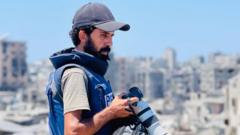Facebook has been noted for enforcing severe restrictions on Palestinian news organizations during the ongoing Israel-Gaza war, according to research conducted by the BBC. The analysis indicates that newsrooms in the Palestinian territories, including both Gaza and the West Bank, have experienced a substantial reduction in audience engagement following the onset of conflict in October 2023. Leaked documents from Instagram, another platform owned by Facebook's parent company Meta, reveal increased moderation of comments from Palestinian users since the conflict began.
Meta firmly denies allegations that it has intentionally suppressed Palestinian voices, labeling the claims as "unequivocally false." As on-the-ground reporting has nearly dried up due to limited access for foreign journalists to Gaza, social media has become an essential outlet for updates from the region. Prominent Palestinian news organizations, such as Palestine TV and the Wafa news agency, have seen their Facebook pages transformed into critical channels for news dissemination worldwide.
In a detailed analysis of engagement data from 20 significant Palestinian-based news outlets prior to and following the Hamas attacks on October 7, 2023, the BBC found a staggering 77% decline in audience engagement. Palestine TV, which boasts 5.8 million followers, reported a 60% decrease in visibility for its posts, with a journalist stating, "Interaction was completely restricted, and our posts stopped reaching people." This pattern has fostered ongoing fears among Palestinian journalists regarding potential "shadow-banning" of their content by Meta.
In comparison, an examination of 20 Israeli news organizations yielded a different outcome. These outlets, including well-known names like Yediot Ahronot and Israel Hayom, saw their audience engagement rise by about 37%, highlighting a disparity in how content from both sides of the conflict is managed.
Meta's past performance has drawn scrutiny for failing to fairly moderate online activity, with some reports attributing misinterpretations in Arabic-language content to a lack of Arabic-speaking moderators. The BBC's analysis of Arabic-language news pages from outside of Palestine showed contrary results, with these sources experiencing an average increase in engagement of nearly 100%, contrasting noticeably with the Palestinian sites.
In response to concerns about moderation changes, Meta acknowledged implementing "temporary product and policy measures" beginning in October 2023 to navigate a balance between freedom of expression and the necessity to control content linked to US-sanctioned organizations like Hamas. A spokesperson from Meta reiterated the company's stance, stating their actions were not aimed at any specific group, mentioning the need to address what they described as a "spike in hateful content."
Compounding the issue, internal documents indicate that Instagram's algorithm underwent modifications that made moderation of comments from Palestinian users more stringent following the declaration of war. Employees have expressed apprehension about these actions, fearing they could introduce bias against Palestinian users within the moderation process. Despite these challenges, many journalists on the ground remain committed to reporting, even amidst significant risks, stating that crucial real-time information from Gaza must continue to be shared.



















